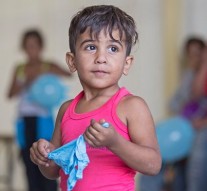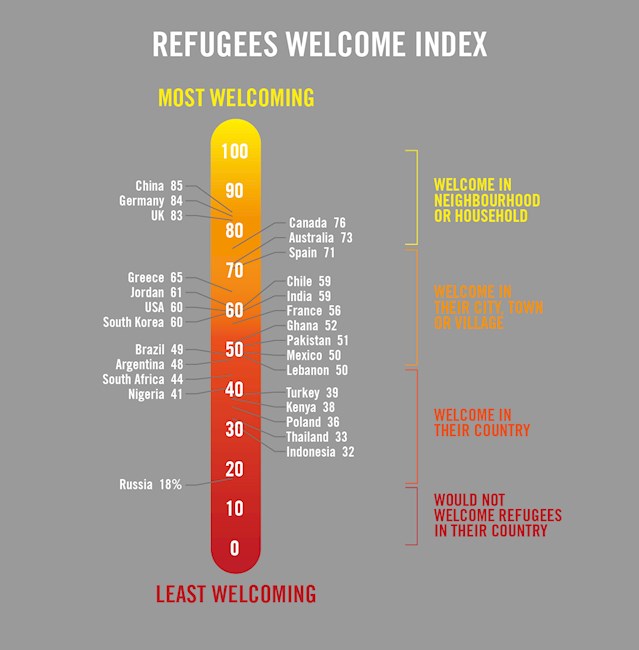
Most of People Would Welcome Refugees, says Global Survey
Migration 20 May 2016A global survey commissioned by Amnesty International, Refugees Welcome Index, has found out that the vast majority of people (80%) would welcome refugees with open arms – many are even prepared to take them into their own homes.
The new Refugees Welcome Index ranks 27 countries across all continents based on more than 27,000 people’s willingness to let refugees live in their countries, towns, neighbourhoods and homes.
Countries are ranked on a scale of 0 to 100, where 0 means that none of the respondents would allow refugees to enter the country and 100 means that all respondents would accept refugees into their neighbourhood or home.
People were asked how closely they would accept refugees on a sliding scale: in their home, their neighbourhood, their city/town/village or in their country – or if they would refuse them entry to the country altogether.
Astonishingly, the results of survey show how people are eager to make refugees welcome and how anti-refugee political rhetoric is out of kilter with public opinion.
“We did not expect to see such strong levels of solidarity with refugees, but the results reflect the inspiring human compassion people feel to those fleeing war. They want to do what they can to help, not turn their backs. Politicians need to show the same spirit,” said Salil Shetty , Secretary General of Amnesty International.
One Person in 10 Worldwide Would Take Refugees Home
 Globally, one person in 10 would take refugees into their home, while 32% said they would accept refugees in their neighbourhood, 47% in their city/town/village and 80% in their country. Only 17% said they would refuse refugees entry to their country. Only in Russia, did more than a third of people say they would deny them access (61%).
Globally, one person in 10 would take refugees into their home, while 32% said they would accept refugees in their neighbourhood, 47% in their city/town/village and 80% in their country. Only 17% said they would refuse refugees entry to their country. Only in Russia, did more than a third of people say they would deny them access (61%).
Instead, almost half of people surveyed in China (46%) said they would accept refugees into their own home.
People in the UK are the second-most willing to welcome refugees in their own homes (29%). In addition to that, another 47% answered that they would accept refugees into their neighbourhood. The vast majority of British people (87%) would let refugees into their country.
More than half of German respondents (56%) said they would accept refugees in their neighbourhood, and a further one in 10 would welcome them into their home. Almost all Germans (96%) said they would allow refugees into their country, with only 3% saying they would refuse them to enter.
No signs of flagging acceptance was shown by people living in those countries that have already accepted large numbers of refugees, with Greece and Jordan joining Germany in the top 10 of the Index.
“These figures speak for themselves. People are ready to make refugees welcome, but governments’ inhumane responses to the refugee crisis are badly out of touch with the views of their own citizens,” said Salil Shetty, “governments cannot allow their response to the refugee crisis to be held hostage by headlines. Too often they use xenophobic anti-refugee rhetoric to chase approval ratings. This survey suggests they are not listening to the silent majority of welcoming citizens who take the refugee crisis personally.”
For more information on the European Asylum System and what the European Union does for Migrants and Refugees, read “European Asylum Reform: Dublin IV Is A Gift to Cameron” and “Europe Is not in Good Shape to Fight against Migrants Smugglers.”
In the survey used to construct the Index, people were also asked two other questions about access to asylum and current refugee policies. According to the results, 73% of people agreed that people fleeing war or persecution should be able to take refuge in other countries and 66% of people said their governments should do more to help refugees. Only in Russia (26%), Thailand (29%) and India (41%) people showed the least support for more government action.
“People seem to be more committed to principles set down in international law than many of their governments, who are increasingly tearing up or ignoring commitments that have stood for 65 years,” concluded Shetty.
Refugees Should be Helped, Protected and Welcomed into Communities
Amnesty International is calling on governments to resettle 1.2 million refugees by the end of 2017, so to respond to the global refugee crisis. That is far more than the 100,000 per year governments are currently taking annually, but less than a tenth of the 19.5 million refugees in the world today.
Ahead of next week’s World Humanitarian Summit in Istanbul on 23-24 May, Amnesty International is requiring governments to commit to a new, permanent system for sharing the responsibility to host and assist refugees.
Called “Global Compact on responsibility-sharing”, this system were already proposed by the UN on 9 May and it would then be adopted at a high-level UN summit of world leaders on 19 September. Both summits were convened by UN Secretary-General Ban Ki-moon to address the biggest humanitarian and refugee crises in 70 years.
At the World Humanitarian Summit, Governments are also supposed to address the $15 billion shortfall in humanitarian funding. Indeed, more money is needed to support both refugees and the countries hosting large numbers of refugees, as highlighted by the United Nations at the beginning of 2016.
“Governments’ efforts to keep out people fleeing war and persecution fly in the face of the humanity and solidarity shown by their own citizens, not to mention their obligations under international law,” said Salil Shetty, “refugees should be helped, protected and welcomed into communities, not held at arm’s length in refugee camps and detention centres.”
Read “Austria Builds Barriers: Brenner Pass Closed for Migrants” and “EU-Turkey deal: is Europe doing the right thing?” for more information on the condition of migrants and refugees in Europe.


